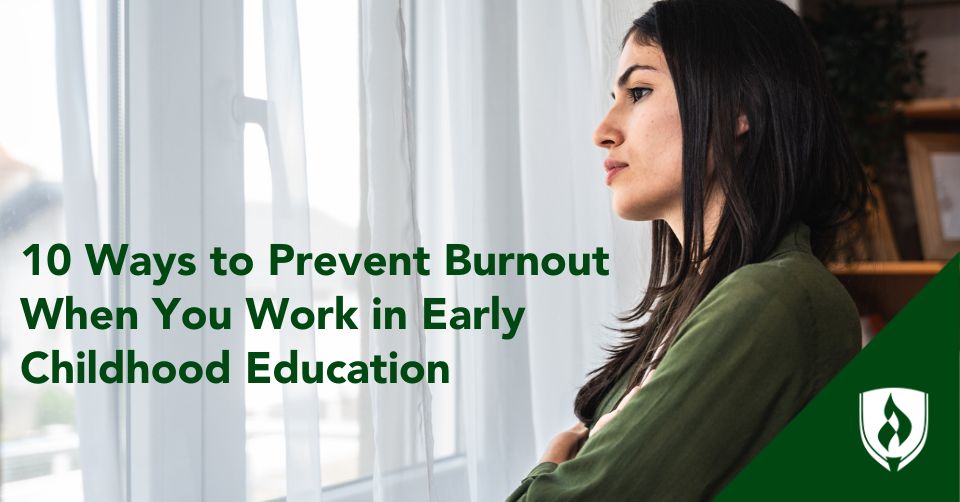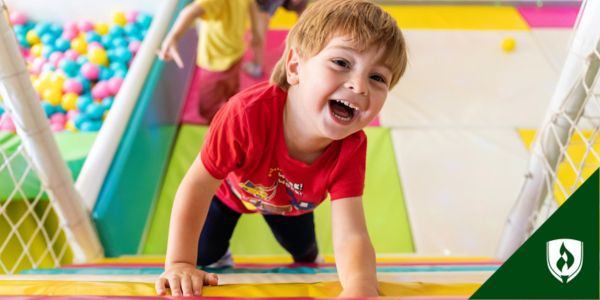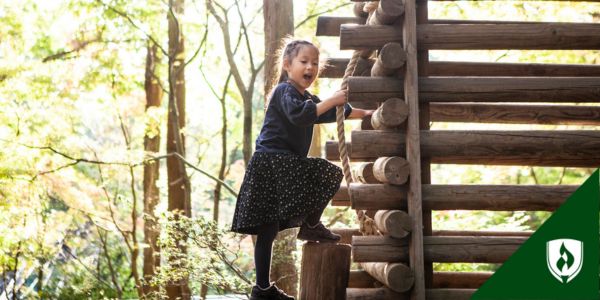
Being an early childhood educator can be one of the most rewarding careers out there! Educators are such an important part of children’s lives. Little ones soak up the love, lessons and inspiration their early educators share with them, and it has a significant impact on their earliest development.
The impact will last their lifetime.
If you work in early childhood education, you already know that the reason your work is so powerful is also the same reason it can be draining. That reason is that you care. A lot.
In the childcare sector, one of the leading causes of burnout is just the nature of the work. It is highly physical and highly emotional. You are taking in and absorbing all the little emotions of all the little people: the children in your care, as well as (sometimes) their family stressors.
When something happens to a child or their family, and they come in with those stressors and feelings, you feel it—even though it’s not happening to you.
If you combine that with wages that are often too low and hours that are often too long, you can start to feel burned out even before you have an especially rough day.
What does ECE burnout look like?
Burnout is a state of emotional, physical and mental exhaustion caused by prolonged stress.
Everyone will experience times of stress, some lasting longer than others. When that becomes overwhelming, it can turn into burnout. Burnout can be a significant issue in the early childhood education profession, affecting educators' well-being and the quality of care they provide to children and families.
Here are some signs of burnout in ECE...
- Loss of drive/prolonged reluctance to do tasks for work
- Loss of energy
- Days and weeks where you no longer feel your love of the job or your students
- Irritation at students and families that overshadows the care you once felt
Those experiencing burnout may feel as though there is no way out except to leave the early childhood education field altogether, and many good teachers do exactly that. This leads to high turnover and inconsistency for the children and families, as well as an overall shortage of early childhood professionals.
How can early childhood educators avoid burnout?
You can absolutely prevent burnout in ECE. It may just look a little different than taking care of yourself in other careers might look.
Connecting with proactive strategies to help reduce stress and the loss of joy in your work will help prevent burnout. Remember, flight attendants will tell you to secure your oxygen mask first before helping younger children with their masks in an emergency. So now is the time to adjust your own oxygen mask.
Here are ten practical strategies to help you stay clear of burnout and keep doing the important work with children you love.
1. Understand your risk and balance your expectations
The first way to prevent burnout is to understand that educators do experience stress from their responsibilities and the high expectations they face. If you come into your first early childhood role expecting it to be stress-free, you’ll have a hard time adjusting.
I remember one teacher I worked with who came to her first role right from university. She came from a large family and had lots of experience working with little cousins and family members, but no real experience in a classroom working with groups of children.
She was so excited to start, and she was co-teaching with more experienced teachers, one of whom was going to mentor her in a classroom of twenty 3- to 5-year-olds.
She only lasted a week.
The main issue was that these kids were, well, BUSY. The new teacher was not used to how children played. Her prior experience with children was in a more ordered environment where kids all followed directions and did tasks at the same time. She was not ready for how out of control she felt in the larger classroom.
The other teacher in the room, however, was very used to it and felt in control. She had different expectations for how that many children of mixed ages would/should behave in a large group setting, and the very active nature of their play was something she took in stride.
2. Spend time with people who understand what this role is like
ECE teachers have a valuable combination of education and direct experience. We have to learn so much about early childhood development, and we are responsible for protecting the lives of these children, their health and safety, their social and emotional development.
All of that inside the rigor of school—there's so much to do. Then it’s deflating to hear someone use the term “babysitting” or “day-care” (I like to say, we don’t care for the days, we care for the child.) I certainly wish more people understood just how much knowledge and experience and dedication early childhood educators put forth on a daily basis.
If you don’t feel respected and valued at work, it’s important to find or build some of that community around you. Develop colleagues or mentors in the field of ECE who do understand how capable, knowledgeable and qualified you are—and how important your work is.
3. Make a friend who works in a different classroom or school
When you are building that ECE-supportive community, try to branch out beyond your workplace—or at least beyond your classroom.
Sometimes colleagues give us amazing solidarity, but those conversations can also turn into repeating “vent” sessions where you both mainly complain about the challenges.
If you connect with someone who works with a different age group or the same age group in a different place, you’ll be more likely to gain useful, positive benefits. They are removed just enough to allow you to share without judgement and get fresh perspective.
4. Practice mindfulness during the day
This has been the most important aspect of self-care in ECE for me. I incorporate mindfulness practices into my daily routine.
I've paid attention to how I feel about things and how my body is reacting to things. Am I nauseous, am I tense, am I tired? When I notice that I’m feeling stress or wanting to give up, I’m going to take a second to breathe and reflect for a moment. Then I’m going to go interrupt the activity or do something. It helps me to be really mindful about how I’m reacting and what that means.
Even a few minutes of stepping away from your tasks can help you recharge and maintain your energy levels.
When you aren’t at work, practice techniques such as deep breathing, meditation or yoga. Then, when possible, start utilizing those same techniques in a moment of stress on the job. You can even implement these practices with the children as part of their daily routine!
For a deeper dive into this idea, check out 7 Benefits of Reflection in Early Childhood Education.
5. Practice mindfulness with families too
Mindfulness can help with families and parents as well.
One thing to be mindful of, especially when you have conflict with family members, is that however frustrated they might seem—they still trust you. They are trusting you with their lives, their joy, the wellbeing of their children. That kind of trust cannot be measured.
If they’re still there, they didn’t take their child and leave. That means that whatever happened, you still have their trust. Remember that, and try to help families see beyond the problem of the moment.
Sure, she skinned her knee on the playground, but that’s because she was playing with another child for the first time and having so much fun that she ran faster than normal and tried new things.
Show them some of those little incredible moments of growth and joy you get to witness. It’s easy to forget that the families don’t get to see much of what we see. And in the hustle of drop off and pickup, we don’t get to convey those huge moments of learning. Keep that in focus whenever you interact with a child’s loved ones.
6. Make the wellbeing of each child central to everything
Many early childhood educators arrive in this career because they had a rough childhood and want to protect children from the harm they experienced. Whatever your childhood looked like, if you’re here, you are probably doing it because you care about children’s wellbeing.
And you see the difference it can make for children to have knowledgeable, caring teachers in their daily lives.
One of the things I see in teachers and ECE directors who thrive is a pillar in their mindset of “we do what is best for the child.”
It doesn’t matter how the activity went, or if the parent was upset, you do what is best for those children. Always.
It may not be what’s best for you, the parent, or the program you work for—but what's best for the child should always guide you. That’s helped me a lot to balance the stress. I ask myself, what am I doing that’s going to benefit these children?
Then, I don’t get as bogged down by all the requirements, standards and expectations that come with these roles.
Understanding how to navigate what is best for each child isn’t exactly easy, but with a good early childhood education program under your belt and some experience, you can start to understand what children really need.
7. Get serious about self-care
You absolutely cannot care for children if you cannot care for yourself.
You need to stand up for yourself and for what you need. That includes setting firm boundaries between work and your personal life.
Avoid taking work home whenever possible and set specific times to disconnect from work-related tasks or activities. That mental barrier will help protect you from activating stress while trying to rest or enjoy things in your free time.
Along with the mental aspect, this is a very physical job, and you need to take care of your body. Ensure you get enough sleep, eat nutritious meals/snacks, and engage in regular physical activity. Try to treat yourself with the same level of care you provide the children.
You’ll thank yourself for the extra health when the cold viruses, stomach bugs, strep throats and more start going around.
8. Participate in professional development
Engage in continuous learning and professional development. Attending workshops, conferences, or online courses can reignite your passion and provide new strategies for children and your program.
These resources can help you build confidence in your work. And they can give you new ideas for keeping your classroom and schedule organized—which in turn can reduce stress.
Professional development and learning is an especially good burnout prevention option if you are feeling stuck in the same patterns or trapped in your role.
9. Line up a therapist
A great burnout prevention tip is to have the name and number of a therapist you could reach out to if you notice yourself burning out.
It’s hard to do that kind of research when you are already in crisis.
Talking to somebody can make a huge difference. I’ve known too many people who don’t want to share or rely on someone else. Maybe they are embarrassed or worried that it makes them seem weak. But if you start to burn out, you need to understand where the exhaustion is coming from.
10. Celebrate small wins
Acknowledge and celebrate the small successes in your day. Whether it's a child's progress or a well-received lesson plan, recognizing these moments can boost your morale and motivation. Celebrate the joy!
A career win doesn’t look the same in ECE as it might in other industries. The most rewarding moments in this job come from the children in your care. Their love and affection for you, their sudden realizations, the way they succeed when things are hard for them—every little bright flare of growth and light is something to get excited about.
You are changing the world, more than you know
You care for other people’s children, and that is an honor.
Parents are the child’s first teacher, but then they’re with you. Your influence is there—in their memory, ability and learning as they grow into adulthood.
Preventing burnout is always a mixture of reducing stressors and increasing joy. If you could use some inspiration, joy and fresh ideas for your work with little ones, check out Early Childhood Educators Step Up: 7 Inspiring Examples of Intentional Teaching.
The Early Childhood Education programs at Rasmussen University are not designed to meet, and do not meet, the educational requirements for licensure to teach in public preschools, or kindergarten, elementary, or secondary schools in any state. The Rasmussen University Early Childhood Education programs are not approved by any state agency that licenses teachers. Before enrolling, it is important to understand all of the licensure eligibility standards for a desired career by consulting the appropriate state and school/facility requirements.




